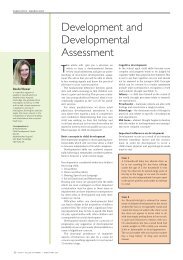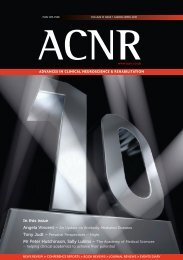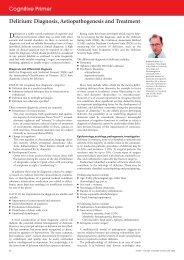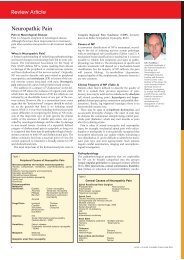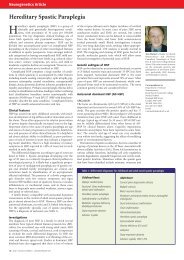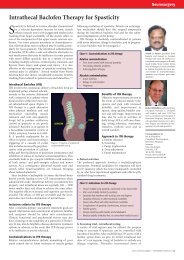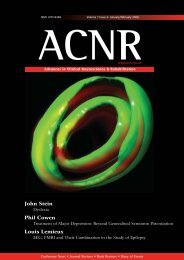Unn Ljøstad and Åse Mygland Jone Furlund Owe and Nils ... - ACNR
Unn Ljøstad and Åse Mygland Jone Furlund Owe and Nils ... - ACNR
Unn Ljøstad and Åse Mygland Jone Furlund Owe and Nils ... - ACNR
You also want an ePaper? Increase the reach of your titles
YUMPU automatically turns print PDFs into web optimized ePapers that Google loves.
Today, unnecessary seizures<br />
restrict 69,000 lives 1<br />
The chance to control seizures, not lives<br />
ABBREVIATED PRESCRIBING INFORMATION<br />
Zonegran ® (zonisamide)<br />
Please refer to the SmPC before prescribing.<br />
Presentation: Hard capsules containing 25 mg, 50 mg or 100 mg zonisamide.<br />
Indication: Adjunctive therapy in the treatment of adult patients with partial<br />
seizures, with or without secondary generalisation. Dose <strong>and</strong> administration:<br />
Adult: Zonegran must be added to existing therapy. Initial daily dose is<br />
50 mg in two divided doses. After one week, increase to 100 mg daily <strong>and</strong><br />
then at one weekly intervals, in 100 mg increments. Consider two weekly<br />
intervals in renal or hepatic impairment <strong>and</strong> patients not receiving CYP3A4-<br />
inducing agents. Zonegran can be administered once or twice daily after the<br />
titration phase. Withdraw gradually. Elderly <strong>and</strong> patients with renal or hepatic<br />
impairment: Caution (see SmPC). Not recommended in severe hepatic<br />
impairment. Children <strong>and</strong> adolescents under 18 years: Not recommended.<br />
Contra-Indications: Hypersensitivity to zonisamide, sulphonamide or any<br />
excipient. Pregnancy: Zonegran must not be used during pregnancy unless<br />
clearly necessary in the opinion of the physician, <strong>and</strong> only if potential benefits<br />
justify risk to the foetus. Specialist advice should be given to women who are<br />
likely to become pregnant in order to consider the optimal treatment during<br />
pregnancy. Women of childbearing potential must use contraception during<br />
treatment <strong>and</strong> for one month after discontinuation. Lactation: Zonisamide<br />
is excreted into breast milk. A decision must be made to either discontinue<br />
Zonegran or stop breast-feeding. Breast-feeding should not be resumed<br />
until one month after stopping Zonegran. Warnings <strong>and</strong> Precautions:<br />
Serious rashes occur in association with Zonegran therapy, including<br />
cases of Stevens-Johnson syndrome. Zonegran contains a sulphonamide<br />
group. Serious immune based adverse reactions are associated with the<br />
sulphonamide group, e.g. rash, allergic reaction, major haematological<br />
disturbances including aplastic anaemia, which very rarely can be fatal.<br />
Closely supervise <strong>and</strong> consider discontinuation in patients with unexplained<br />
rash. Cases of agranulocytosis, thrombocytopenia, leukopenia, aplastic<br />
anaemia, pancytopenia <strong>and</strong> leucocytosis have been reported. Kidney<br />
stones have occurred. Use with caution in patients with risk factors<br />
for nephrolithiasis, including prior stone formation, a family history of<br />
nephrolithiasis <strong>and</strong> hypercalcuria. Use with caution in patients treated with<br />
carbonic anhydrase inhibitors, e.g. topiramate. Decreased sweating, elevated<br />
body temperature <strong>and</strong> heat stroke have been reported. Patients should<br />
maintain hydration <strong>and</strong> avoid excessive temperatures. Monitor pancreatic<br />
lipase <strong>and</strong> amylase levels in patients taking Zonegran who develop clinical<br />
signs <strong>and</strong> symptoms of pancreatitis, <strong>and</strong> consider discontinuation in absence<br />
of another cause. In cases of severe muscle pain/weakness with or without<br />
fever, assess markers of muscle damage, e.g. serum creatine phosphokinase<br />
<strong>and</strong> aldolase levels, <strong>and</strong> consider discontinuation. Zonegran 100 mg hard<br />
capsules contain E110, which may cause allergic reactions. Caution in<br />
patients less than 40 kg. In patients with weight loss consider dietary<br />
supplement, increased food intake or discontinuation. Drug Interactions: No<br />
clinically relevant pharmacokinetic effects on carbamazepine, lamotrigine,<br />
phenytoin, sodium valproate, oral contraceptives (ethinylestradiol or<br />
norethisterone). Insufficient data with carbonic anhydrase inhibitors,<br />
e.g.topiramate. Zonegran was not affected by lamotrigine or CYP3A4<br />
inhibitors. Caution with drugs which are P-gp substrates. Avoid concomitant<br />
administration with drugs causing urolithiasis. Zonisamide is metabolised<br />
partly by CYP3A4, N-acetyl-transferases <strong>and</strong> conjugation with glucuronic<br />
acid; therefore caution with substances that can induce or inhibit these<br />
enzymes. Side effects: The most common adverse reactions in controlled<br />
adjunctive-therapy studies were somnolence, dizziness <strong>and</strong> anorexia.<br />
Adverse reactions associated with Zonegran in clinical studies <strong>and</strong> postmarketing<br />
surveillance: Very common effects (≥1/10): anorexia, agitation,<br />
irritability, confusional state, depression, ataxia, dizziness, memory<br />
impairment, somnolence, diplopia, decreased bicarbonate. Common effects<br />
(≥1/100,




